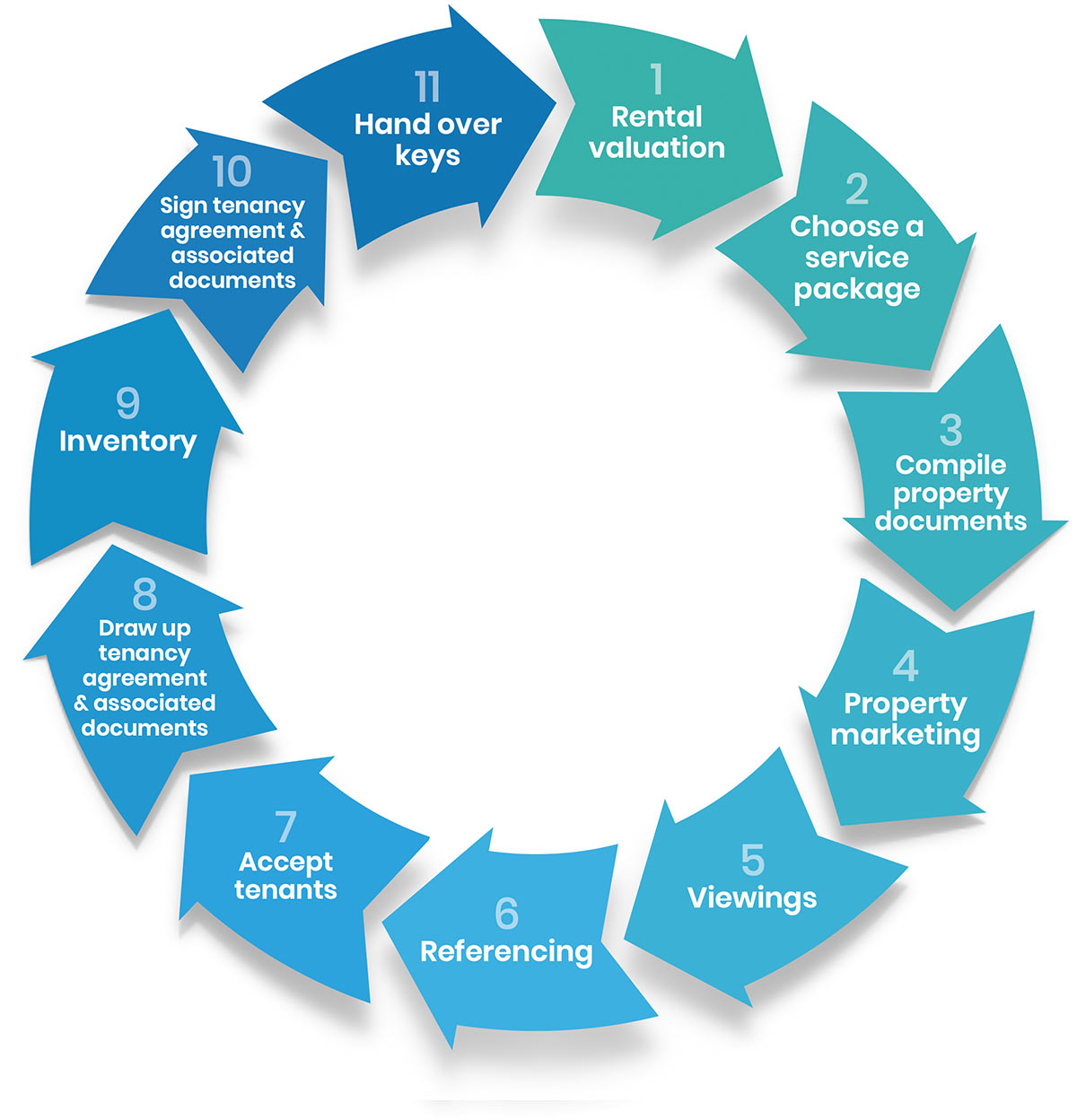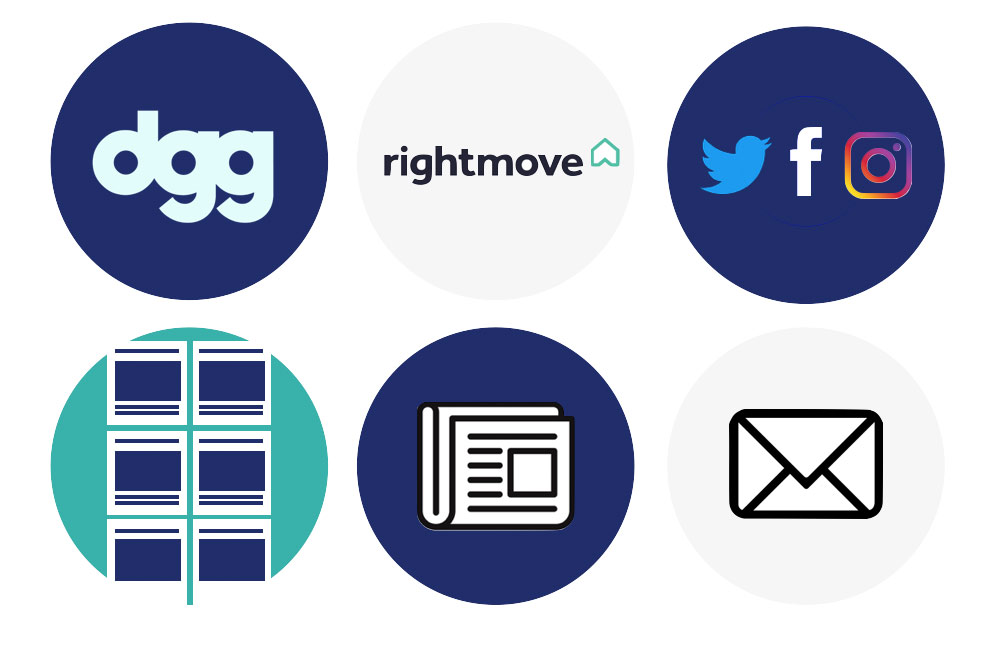When renting your property, many decisions will need to be made to take the property from empty to let. With property letting, it is imperative the property and tenancy comply with all the current private sector letting legislation and regulations; this will ensure your property is safe for tenants to live in and enable a hassle-free process when taking back possession if required.
The Lettings Process
Maintaining property and tenancy compliance is one of the many reasons landlords choose DGG Property Consultants as their agent as we help them successfully navigate the various lettings processes.

Choosing the right service
At DGG, we offer landlords a suite of lettings and property management services,
each with varying levels of ongoing support and landlord involvement once the tenancy is set up.
Our packages have been designed to suit landlords with different levels of experience and needs
Tenant Find
The ‘tenant find’ service is perfect for experienced landlords. We find you suitable, well-referenced tenants, set up the tenancy, and then hand the ongoing management over to you. This is the most ‘hands on’ option as the landlord manages all aspects of the tenancy and property management once keys are handed over to the new tenants.
Full Management
Our most popular package includes tenant find, tenancy set up, and ongoing tenancy and property management, giving you peace of mind of having an experienced agent by your side throughout the tenancy. This is the middle ground regarding landlord involvement; DGG facilitates and advises throughout the tenancy, but control over the property remains with the landlord.
Rent Guarantee – Lease Deal
Landlords receive a set guaranteed rental payment every month regardless of the property status (let, empty, defaulting). DGG also take responsibility for all property compliance and maintenance works up to £1,000 for pre-agreed defects or faults. This is the best option for ‘hands off’ landlords as DGG takes control of the property for the lease period.
Property compliance
Several property documents and compliance measures are required before renting out your property to comply with statutory and regulatory requirements. We detail what you need below.
If you are missing any of these, we can arrange to have them completed on your behalf.
Gas Safety Record (GSR)
A suitably qualified gas engineer must inspect and pass all gas appliances in the property as safe to use, and a copy of the GSR must be served on the tenants. The GSR record needs updating annually.
EPC (Energy Performance Certificate)
An EPC will need completing on the property by an energy assessor before the property is let. The EPC provides valuable information about expected running costs and efficiency. A property with an EPC grading below an E cannot be rented; however, we can assist with works required to achieve a higher grading if your property falls below this grading. An EPC is valid for ten years, and a copy will need to be served on tenants.
EICR (Electrical Installation Condition Report)
The electrical installation will need testing every five years, or before any new tenancy, by a suitably qualified electrician to meet current safety regulations. A ‘satisfactory’ report will need serving on the tenants.
Smoke and Carbon Monoxide Alarms
You must have smoke detectors installed in the property on each floor where there is living accommodation. We recommend the installation of wired interlinked units to meet best practice. A carbon monoxide alarm will also need installing by any solid fuel-burning appliance, and we strongly recommend landlords install a monoxide alarm near gas-burning appliances.
Furnishing
Several property documents and compliance measures are required before renting out your property to comply with statutory and regulatory requirements. We detail what you need below.
If you are missing any of these, we can arrange to have them completed on your behalf.
Unfurnished
Renting your property as unfurnished allows a tenant to use much of their own furniture and appliances and is the most popular furnishing type chosen by our landlords. In addition, unfurnished properties generally carry the least legislation as landlords are not responsible for any portable appliances or furniture. We do, however, recommend curtain poles/blinds be installed. Where blinds are installed, they must comply with safety standards to prevent injury.
Part – Furnished
Renting your property as part–furnished generally means the landlord provides some furniture and portable appliances such as fridge/freezer, sofa, dining table, chairs, blinds/curtains. When providing portable appliances, they must be regularly PAT (Portable Appliance Test) tested by a qualified electrician. Additionally, where blinds are installed, they must comply with safety standards to prevent injury, and any furniture provided must comply with fire regulations and have a fire safety label attached.
Fully Furnished
Renting your property as fully furnished generally means providing everything a tenant would need to move in straight away. A landlord would be expected to provide items such as fridge/freezer, sofa, dining table, chairs, wardrobes, blinds/curtains, beds, mattresses, washing machine, microwave etc., as part of a fully furnished let. You will need to ensure any portable appliances are regularly PAT (Portable Appliance Test) tested by a qualified electrician. Where blinds are installed, they comply with safety standards to prevent injury, and regarding furniture, all items provided must comply with fire regulations and have a fire safety label attached.

Presenting your property
First impressions count, and with property, it’s no different. A well-presented property attracts more interest, higher rents, and longer tenancies. Therefore, we strongly recommend getting everything in order internally and externally before marketing.
The property’s interior should have a fresh feel, ideally decorated with neutral tones throughout with functional fixtures. Don’t forget about outside spaces; ensure these areas are well maintained and any fences or gates are in good working order.
We recommend having the property professionally cleaned at the beginning of the tenancy; this allows a standard of cleanliness to be maintained throughout tenancies.
Property Marketing
We aim to give your property maximum exposure to attract the best tenants. We will feature your property on the online property portals, our website, social media handles, local news publications and display a window card in our office window. Targeted emails will also be sent to pre-approved applicants looking for a property matching your property’s specification. A ‘To Let’ board will also be erected upon instruction.

Moving your tenant in
Referencing and Offer
Once you have accepted an offer from an applicant who meets pre-reference checks, we conduct thorough referencing through our referencing partners, Rent4Sure. A credit check, employment check, affordability check, Right to Rent check and current landlord or agent reference is sought. Once we have all the required information, we put forward successful applicants to you for final consideration.
Once you have accepted an offer from a prospective tenant to let your property, we take a holding deposit to reserve the property for them, set a move-in date, and begin the move-in process.
Inventory
A thorough photographic inventory report will be completed before the tenants move in. This document details the property condition at the start of the tenancy and helps avoid disputes over the deposit once the tenants vacate. Meter readings are taken to ensure actuate bills for all parties. Our office will update all utilities of the change of occupancy once the tenancy agreement is signed.
The signing of the tenancy agreement
A draft contract will be sent to the tenants and a copy of the Energy Performance Certificate and the Government’s How to Rent Guide before the tenancy agreement is signed.
Your tenants will then sign the tenancy agreement, settle monies owed on account, and receive the required property documents, including the deposit prescribed information and associated documents. Keys are then handed over on the tenancy commencement date.
Deposit
We hold and protect the tenant deposit in our deposit protection scheme within 30 days of the tenancy commencing. Our nominated scheme is the DPS (Deposit Protection Scheme) Insured. You can find more information about the scheme here https://www.depositprotection.com/insured-guides/
Maintenance
DGG will inform, advise, and instruct (with your authority) maintenance works required at your property. We take the stress out of property maintenance by managing all aspects of property maintenance. Our reputable team of tradespeople can complete anything from minor repair works through to larger refurbishment projects.


